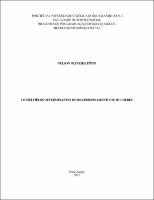| Share record |


|
Please use this identifier to cite or link to this item:
https://tede2.pucrs.br/tede2/handle/tede/7272| Document type: | Dissertação |
| Title: | Os múltiplos determinantes do reaprisionamento de mulheres |
| Author: | Pinto, Nelson Oliveira  |
| Advisor: | Gershenson, Beatriz |
| Abstract (native): | A pesquisa aborda os múltiplos determinantes que influenciam no reaprisionamento de mulheres e teve a preocupação de situar o tema sob a ótica dos Direitos Humanos, mas, também, multidisciplinarmente, articulando as áreas do Direito e do Serviço Social. Como ponte entre essas áreas de conhecimento, foi utilizada a criminologia crítica, que ao contrário da criminologia tradicional, vai valorizar nas histórias dessas mulheres privadas de liberdade, seus esforços de luta, enfrentamentos, na busca para sobreviver, reconhecendo quais foram as experiências que lhes trouxeram para prisão e a razão das punições mais rigorosas, pelo fato de serem mulheres, selecionadas pela classe social, e, ainda, submetidas a “castigos” físicos e psicológicos, com o aval do Poder Judiciário, dentro da penitenciária. Trata-se de um estudo de natureza qualitativa, realizado na Penitenciária Feminina Madre Peletier em Porto Alegre, utilizando como técnicas de pesquisa entrevistas semiestruturadas com mulheres em situação de restrição de liberdade, entrevistas com as servidoras encarregadas em mantê-las, a observação participante da dinâmica prisional e análise de documentos, que teve por fontes a legislação nacional e internacional, bem como os discursos oficiais exarados nos documentos, decretos e resoluções do sistema punitivo. A pesquisa revela a realidade perversa vivenciada pelas mulheres reaprisionadas, o que impõe a necessidade de desconstrução desses dois sistemas – criminal e o penitenciário - que carregam as marcas tradicionais de seleção penal e da arbitrariedade, além de afrontarem os tratados internacionais firmados contra a tortura e também os de garantias de direitos humanos. Nessa perspectiva as mulheres partícipes do estudo são vistas nas suas especificidades e peculiaridades, considerando aspectos econômicos, estruturais, sociais e culturais de suas experiências de vida que as colocam em um ciclo de prisões, antes, durante e depois de passarem por situações concretas de encarceramento, eis que são prisioneiras, pelo fato de serem pobres, sofrendo todas as violências dessa situação. O estudo conclui que as mulheres reaprisionadas nascem aprisionadas pela própria vulnerabilidade social e suas consequências, face as suas relações familiares conflitivas, o enfrentamento da violência doméstica, a vivência de exclusão dentro da própria região onde residem, fazendo com que mesmo liberadas pelo sistema prisional, retornem a esse outro tipo de prisão, que são as condições precárias das suas vidas sociais, carregadas de opressões de gênero. |
| Abstract (english): | The research addresses the multiple determinants that influence the reaprision of women and has been concerned to situate the issue from the point of view of Human Rights, but also, multidisciplinarily, articulating the areas of Law and Social Work. As a bridge between these areas of knowledge, critical criminology was used, which, unlike traditional criminology, will value in the stories of these women deprived of their freedom, their struggle efforts, confrontations, the quest to survive, recognizing what experiences brought them to prison and the reason for more rigorous punishments, because they were women, selected by their social class, and also subjected to physical and psychological "punishments", with the approval of the Judiciary, within the penitentiary. This is a qualitative study, carried out at the Madre Peletier Women's Penitentiary in Porto Alegre, using as research techniques semi-structured interviews with women in situation of restriction of freedom, interviews with the female agents responsible for maintaining them in prision, participative observation of prison dynamics, and document analysis, which had as sources the national and international legislation, as well as the official speeches contained in documents, decrees and resolutions of the punitive system.The research reveals the perverse reality experienced by women who have been re-confined, which imposes the need to deconstruct these two systems - criminal and penitentiary - that carry the traditional marks of criminal selection and arbitrariness, as well as affronting international treaties against torture and also those of human rights guarantees. In this perspective, the women participating in the study are seen in their specificities and peculiarities, considering economic, structural, social and cultural aspects of their life experiences that put them in a cycle of prisons, before, during and after going through concrete situations of incarceration , They are prisoners, because they are poverty, suffering all the violence of this situation.The study concludes that re-confined women are born imprisoned by their own social vulnerability and its consequences, due to their conflicting family relationships, the confrontation of domestic violence, the experience of exclusion within the region where they reside, making them return, even when they are released by the prison system, to this other type of prison, which is the precarious conditions of their social lives, fraught with gender oppression. |
| Keywords: | Gênero Reaprisionamento e Sistema Criminal |
| CNPQ Knowledge Areas: | CIENCIAS SOCIAIS APLICADAS::SERVICO SOCIAL |
| Language: | por |
| Country: | Brasil |
| Publisher: | Pontifícia Universidade Católica do Rio Grande do Sul |
| Institution Acronym: | PUCRS |
| Department: | Escola de Humanidades |
| Program: | Programa de Pós-Graduação em Serviço Social |
| Access type: | Acesso Aberto |
| Fulltext access restriction: | Trabalho não apresenta restrição para publicação |
| URI: | http://tede2.pucrs.br/tede2/handle/tede/7272 |
| Issue Date: | 23-Jan-2017 |
| Appears in Collections: | Programa de Pós-Graduação em Serviço Social |
Files in This Item:
| File | Description | Size | Format | |
|---|---|---|---|---|
| DIS_NELSON_OLIVEIRA_PINTO_COMPLETO.pdf | Texto Completo | 1.2 MB | Adobe PDF |  Download/Open Preview |
Items in DSpace are protected by copyright, with all rights reserved, unless otherwise indicated.




